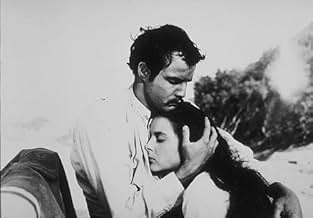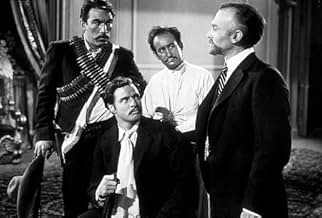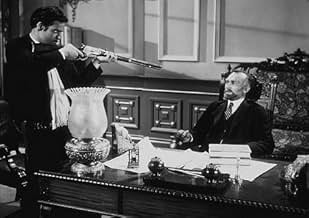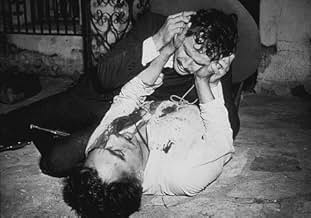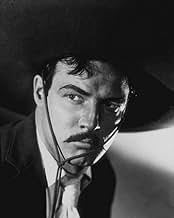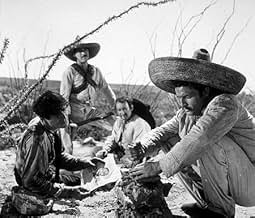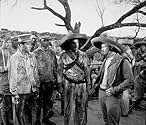The story of Mexican revolutionary Emiliano Zapata, who led a rebellion against the corrupt, oppressive dictatorship of President Porfirio Díaz in the early 20th century.The story of Mexican revolutionary Emiliano Zapata, who led a rebellion against the corrupt, oppressive dictatorship of President Porfirio Díaz in the early 20th century.The story of Mexican revolutionary Emiliano Zapata, who led a rebellion against the corrupt, oppressive dictatorship of President Porfirio Díaz in the early 20th century.
- Won 1 Oscar
- 5 wins & 9 nominations total
Rico Alaniz
- Guard
- (uncredited)
Daniel Armijo
- Undetermined Secondary Role
- (uncredited)
Ross Bagdasarian
- Officer
- (uncredited)
Salvador Baguez
- Soldier
- (uncredited)
- Director
- Writers
- All cast & crew
- Production, box office & more at IMDbPro
Featured reviews
I saw Viva Zapata 50 years ago, when I was 15. And all those years I hoped to see it again sometime. But in the Netherlands it's not available on VHS or DVD. I remember the great performance of Marlon Brando as Zapata. And how I hated Wiseman who played the ultimate traitor. In a magazine I read that Brando, before they shot the picture, spent several weeks in a remote Mexican village to learn the habits of the Mexicans, and he WAS a Mexican in the film! What a performer! I do hope to see once again some day! 9 out of 10.
Hans Dullaart Delft Netherlands.
Hans Dullaart Delft Netherlands.
When I read so many of the comments on this film featured here, I find it difficult to understand how so many viewers fail to appreciate the incredible nature of the collaboration that produced it. The very idea of a motion picture scripted by John Steinbeck, directed by Elia Kazan, scored by Alex North, starring Marlon Brando, co-starring Anthony Quinn........this is an almost unbelievable gathering of artistic giants.
Taste in movies varies and thus one can be certain that some will not respond positively even to this one. After over five decades of movie-going, I can look back and remember precious few pictures that rise to the high level of excellence to be found in "Zapata". With its spellbinding storytelling, superb cast in top form, its insightful examination of issues which are still crucially relevant today, I can not fathom why some would not praise it.
Like a long list of really fine titles that endlessly persist in remaining unavailable in DVD release, this film has me wondering once again why, in the vastness of the internet, one can not discover the reason why this major Brando star-vehicle continues to be withheld from circulation. Is such information so impossible to find that no one can unearth it?
You can tell from reading the viewer comments that not everyone will agree on this, but I would suggest that anyone who appreciates literate, superbly crafted classic motion pictures should make every effort to see this one. I wish I could invite you all to a great gala screening of it. I know you would be dazzled by its splendor.
Taste in movies varies and thus one can be certain that some will not respond positively even to this one. After over five decades of movie-going, I can look back and remember precious few pictures that rise to the high level of excellence to be found in "Zapata". With its spellbinding storytelling, superb cast in top form, its insightful examination of issues which are still crucially relevant today, I can not fathom why some would not praise it.
Like a long list of really fine titles that endlessly persist in remaining unavailable in DVD release, this film has me wondering once again why, in the vastness of the internet, one can not discover the reason why this major Brando star-vehicle continues to be withheld from circulation. Is such information so impossible to find that no one can unearth it?
You can tell from reading the viewer comments that not everyone will agree on this, but I would suggest that anyone who appreciates literate, superbly crafted classic motion pictures should make every effort to see this one. I wish I could invite you all to a great gala screening of it. I know you would be dazzled by its splendor.
This is a pretty good 1950's action/drama considering Elia Kazan had never before or never would again direct an action movie. It's almost like a Western except the setting is the second decade of the 20th century between the years of 1910-1919. Marlon Brando is Mexican revolutionary Emiliano Zapata in a role that earned him an Academy Award nomination. Brando is paired once again with Kazan who directed him the year before in A Streetcar Named Desire and would pair with him a couple of years later in Brando's Oscar winning performance in On the Waterfront. This film is well photographed by Mexican born cinematographer Joe Macdonald who should have been nominated for an Oscar but wasn't. In a rare role for Mexican born Anthony Quinn to be actually playing a Mexican as Eufernio Zapata for which he won the Academy Award for Best supporting Actor for 1952. Quinn's first nomination of four in his career and his first win of two. The film received three other nominations for Art Direction, Music and for it's John Steinbeck written Screenplay. This film is pure Hollywood however and is largely a fictional portrayal of actual events in it's romanticizing tale of one of Mexico's most beloved heroes Zapata. Despite the story by Steinbeck the dialog is weak. It's a good movie but Kazan is out of his element here, Brando is miscast and Steinbeck is lazy. I would give it a 7.5 out of 10.
The story of Mexican revolutionary Emiliano Zapata (Marlon Brando), who led a rebellion against the corrupt, oppressive dictatorship of president Porfirio Diaz (Fay Roope) in the early 20th century.
Sadly, I do not know the story of Zapata well enough to criticize this film for its accuracy or lack thereof. I understand it is somewhat fictional, and of course needs to be to some extent since no one was there writing down every spoken word or action.
But I loved the story, the endless cycle of violence... this is all too true. While revolutions can work (America did alright), they do tend to lead to more revolutions. And while Mexico is stable now (or at least mostly so), it did have a rough history... which made legends out of Zapata and Pancho Villa.
Sadly, I do not know the story of Zapata well enough to criticize this film for its accuracy or lack thereof. I understand it is somewhat fictional, and of course needs to be to some extent since no one was there writing down every spoken word or action.
But I loved the story, the endless cycle of violence... this is all too true. While revolutions can work (America did alright), they do tend to lead to more revolutions. And while Mexico is stable now (or at least mostly so), it did have a rough history... which made legends out of Zapata and Pancho Villa.
The history of Mexico, our southern neighbor (and sometimes victim) is better known to American movie goers than the history of most countries.
You begin with the Maya (KINGS OF THE SUN), the conquest of Mexico (THE CAPTAIN FROM CASTILE), then to the founding of Father Serra's missions in California (SEVEN CITIES OF GOLD), and then the Spanish in the southwest and California (THE MARK OF ZORRO). Mexican - American history begins with the Texas War for Independence (THE ALAMO, THE LAST TEXAN, etc.). We skip to the French "intervention": JUAREZ and VERA CRUZ. Then we tend to skip the long reign of Porfirio Diaz.
Then comes the Mexican Revolution. The number of films that deal with the revolution is vast. But here are just a few titles: VIVA ZAPATA, VIVA VILLA, VILLA RIDES, THE OLD GRINGO (about Ambrose Bierce's probable death in Mexico's revolution), VIVA MARIA (a spoof but it touches on some issues), THE THREE AMIGOS, THEY CAME TO CORDURA (regarding the American Intervention under General Pershing in 1916), THE FUGITIVE (dealing with the anti-Catholic policies of the 1920s and 1930s), and even THE TREASURE OF SIERRA MADRES (when you see the business with Alfonso Badoya's bandit gang against the Federales).
The Mexican Revolution had many heroes. Many were heroes for one group but devils to another. Madero and Carranza stressed the need to have a nation that was loyal to a written constitution. Zapata would be one of the leaders of the land reform movement. Starting with Francisco Madero, going through Pancho Villa and Eufremio Zapata, going to their enemy Venusiano Carranza, to Obregon, Calles, and the great land reformer Lazaro Cardenas - the leadership was varied. The largest concentration of films is on the colorful (and murderous) Villa (a recent cable television movie was about Villa and his contract with D. W. Griffith to shoot a movie, AND STARRING PANCHO VILLA). But historians usually feel that while Villa tended to be on the side of the peasants, he had too much of the bandit in him to be a leader of the revolution's reforms. Zapata, on the other hand actually tried to reform the division of land. His work never got as far as he wanted before he was assassinated, but it was burned into the souls of the people from his region of Mexico (who still call themselves Zapatistas when involved in political protests to this day), and it did help set the stage for Cardenas' reforms in the late 1930s.
With direction by Elia Kazan and screenplay by John Steinbeck, VIVA ZAPATA is a wonderful, if simplistic view of the Revolution for American audiences. Brando underplays the lead for the most part - Zapata was not an explosive personality like Villa. Anthony Quinn is the explosive brother, whose more selfish attitudes leads to his own disaster. Of the supporting players, Alan Reed is good in his scene as Villa, where he discusses the future of Mexico with Zapata. Joseph Wiseman is properly sinister as an constant malcontent agent provocateur, insinuating each leader is too weak or unreliable to lead.
There are great set pieces - like Kazan's symbolic assassination of Madero by General Huerta's goons who drown out the little reformer/orator's voice as he tries to scream with a siren (but it makes the screams of the unheard martyr like a clarion call to Mexico).
Is it real Mexican history? Not quite - it is a version of it. But it is a really well done version of it.
You begin with the Maya (KINGS OF THE SUN), the conquest of Mexico (THE CAPTAIN FROM CASTILE), then to the founding of Father Serra's missions in California (SEVEN CITIES OF GOLD), and then the Spanish in the southwest and California (THE MARK OF ZORRO). Mexican - American history begins with the Texas War for Independence (THE ALAMO, THE LAST TEXAN, etc.). We skip to the French "intervention": JUAREZ and VERA CRUZ. Then we tend to skip the long reign of Porfirio Diaz.
Then comes the Mexican Revolution. The number of films that deal with the revolution is vast. But here are just a few titles: VIVA ZAPATA, VIVA VILLA, VILLA RIDES, THE OLD GRINGO (about Ambrose Bierce's probable death in Mexico's revolution), VIVA MARIA (a spoof but it touches on some issues), THE THREE AMIGOS, THEY CAME TO CORDURA (regarding the American Intervention under General Pershing in 1916), THE FUGITIVE (dealing with the anti-Catholic policies of the 1920s and 1930s), and even THE TREASURE OF SIERRA MADRES (when you see the business with Alfonso Badoya's bandit gang against the Federales).
The Mexican Revolution had many heroes. Many were heroes for one group but devils to another. Madero and Carranza stressed the need to have a nation that was loyal to a written constitution. Zapata would be one of the leaders of the land reform movement. Starting with Francisco Madero, going through Pancho Villa and Eufremio Zapata, going to their enemy Venusiano Carranza, to Obregon, Calles, and the great land reformer Lazaro Cardenas - the leadership was varied. The largest concentration of films is on the colorful (and murderous) Villa (a recent cable television movie was about Villa and his contract with D. W. Griffith to shoot a movie, AND STARRING PANCHO VILLA). But historians usually feel that while Villa tended to be on the side of the peasants, he had too much of the bandit in him to be a leader of the revolution's reforms. Zapata, on the other hand actually tried to reform the division of land. His work never got as far as he wanted before he was assassinated, but it was burned into the souls of the people from his region of Mexico (who still call themselves Zapatistas when involved in political protests to this day), and it did help set the stage for Cardenas' reforms in the late 1930s.
With direction by Elia Kazan and screenplay by John Steinbeck, VIVA ZAPATA is a wonderful, if simplistic view of the Revolution for American audiences. Brando underplays the lead for the most part - Zapata was not an explosive personality like Villa. Anthony Quinn is the explosive brother, whose more selfish attitudes leads to his own disaster. Of the supporting players, Alan Reed is good in his scene as Villa, where he discusses the future of Mexico with Zapata. Joseph Wiseman is properly sinister as an constant malcontent agent provocateur, insinuating each leader is too weak or unreliable to lead.
There are great set pieces - like Kazan's symbolic assassination of Madero by General Huerta's goons who drown out the little reformer/orator's voice as he tries to scream with a siren (but it makes the screams of the unheard martyr like a clarion call to Mexico).
Is it real Mexican history? Not quite - it is a version of it. But it is a really well done version of it.
Did you know
- TriviaAnthony Quinn was very disappointed when Marlon Brando was cast as Emiliano Zapata - he thought that with his Latin appearance, he would have been a better choice. To solve the argument, both actors competed to see which of them could urinate furthest into the Rio Grande. Quinn lost the bet, but he won an Oscar for the best supporting actor as Zapata's brother.
- GoofsThe real Zapata never had a hands-on role in executions. While he would order the executions of close aides, he was never present as he could not bear to watch.
- Quotes
President Porfirio Diaz: These matters take time. You must be patient.
Emiliano Zapata: With your permission, my President, we make our tortillas with corn, not patience.
- Crazy creditsActress Mildred Dunnock is credited in opening credits but not in closing credits.
- ConnectionsFeatured in Marlon Brando: Wild One (1994)
Details
- Release date
- Countries of origin
- Languages
- Also known as
- Zapata
- Filming locations
- Production companies
- See more company credits at IMDbPro
Box office
- Budget
- $1,800,000 (estimated)
- Runtime
- 1h 53m(113 min)
- Color
- Aspect ratio
- 1.37 : 1
Contribute to this page
Suggest an edit or add missing content


